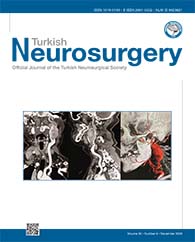2Ordu University, Faculty of Health Sciences, Department of Health Management, Ordu, Turkey DOI : 10.5137/1019-5149.JTN.31940-20.2 AIM: To reveal the impacts of the novel coronavirus 2019 (COVID-19) pandemic on the functioning of neurosurgery clinics and to determine the anxiety levels and attitudes of Turkish neurosurgeons towards their profession during the pandemic.
MATERIAL and METHODS: The Beck anxiety inventory and a clinical activities scale were utilized as data collection tools and distributed to neurosurgeons in Turkey as an online survey. Descriptive statistical methods, significance tests and correlation and regression analyses were employed to analyze the data. The data analysis was carried out in a 95% confidence interval.
RESULTS: Of the 240 neurosurgeons who participated in the study, 63.8% had encountered cases of COVID-19 and 53.8% had handled patients diagnosed with COVID-19. The study results showed that the pandemic did not cause anxiety in 62.9% of the respondents, but it caused mild anxiety in 13.8% and moderate anxiety in 12.12%. The findings also revealed a low linear correlation between the anxiety values and occupational anxiety of the neurosurgeons and low inverse correlation between anxiety values and the protection factor in the pandemic period.
CONCLUSION: The COVID-19 pandemic has caused serious disruptions in the routine functioning of neurosurgery clinics and changes in the attitudes of neurosurgeons. Healthcare organizations should take the necessary precautions and measures to resolve the anxiety problems of healthcare professionals, such as providing professional support, and ensure that they can work in a safer environment.
Keywords : Anxiety level, Beck anxiety inventory, COVID-19, Neurosurgeon, Neurosurgery clinic




